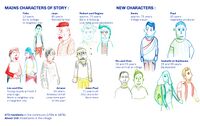LED2LEAP 2020 - Freising Team 9
Jump to navigation
Jump to search
>>>back to working groups overview
| Area | The Olympic rowing regatta course | |
| Place | Oberschleißheim, Munich | |
| Country | Germany | |
| Topics | Landscape Democracy | |
| Author(s) | Naida Kiso, Feryal Halimi, Oluwapelumi Adesoye, Simanta Dash | |

| ||
Landscape Democracy Rationale
- From a landscape democracy perspective, this community context is relevant because it's about a group of people coming together in the same place, to use beautiful landscape for the same interest, and that interest, is engaging in all kinds of sports and leisure activities. This community uses the same area of land to fulfill their human rights for engaging in sports activities.This is where we see the bridging of landscape and human rights which represent landscape democracy.
- This way of use of land is very beneficial for wellness and human health which also helps this landscape area to keep its sports spirit and character.
Location and scope
Phase A: Mapping your Community
Welcome to your community and its landscape
- The Olympic rowing regatta course is located six kilometres north of the Olympic Park, half on Munich soil, half on Oberschleißheim soil, in the Dachauer Moos and covers an area of 850,000 square metres.
- Historical place
- The Olympic Games competition venue
- It represents a piece of post-war heritage
- The facility needs renovation
Groups of actors and stakeholders in your community
- Main Actor groups: Olympic Park, Authority, Clubs/stakeholders, Athletes
- Sub-actor groups: Employee, Visitors, Recreationists
- More Visible groups: athletes
- Less visible groups: visitors
- Do to this Corona situation, we don’t know opinions of local people and all our work is based on assumptions and research through internet.
Relationships between your actors and groups
- Main actor groups are larger groups and they are in power over the smaller sub-actor groups
- add 1-2 graphical representations to the image gallery based on your PPT presentation, you can add more if you like
Summary of your learnings from the transnational discussion panel on April 22
On April 22 you will present the PPT version of this first assignment to other seminar groups working in other geographical community contexts. Please give here a short summary of your learnings during this presentation, for example:
- Other analytical approaches
- Other representation styles
- Other value schemes: any surprises?
- Constructive comments we received on our presentation
Theory reflection
- Stories of Collective Capital is useful to gather and sense the community characteristics and create a foundation for future positive changes.
- The landscape has the relationship between people and governments that the Aarhus convention is based of
- Links environmental rights and human rights
- Acknowledges that we owe an obligation to future generations
- Establishes that sustainable development can be achieved only through the involvement of all stakeholders
- Links government accountability and environmental protection
- Focuses on interactions between the public and public authorities in a democratic context.
References
- Site: https://www.unece.org/info/ece-homepage.html
- Site: file:///C:/Users/PC/Desktop/Kuehne_Antrop_LandscapeConcepts.pdf
- Site: https://regatta.bayern/en/olympic-regatta-center/
- Site: https://www.openpetition.de/petition/online/munich-oberschleissheim-save-the-regatta
- Site: https://www.leistungszentrum-muenchen.de/en/
Phase B: Democratic Landscape Analysis and Assessment
The Scene in your Story of Analysis
- Our challenge; This project is premised on the frequent clashes that occur between the different demography of people who utilize the Olympic Rowing Regatta Course facilities; with emphasis on the sweet-sour relationship between professional athletes and recreationists. This problem is largely due to the multifarious activities happening concurrently on the project site as well as its extensive footprint.
- The Olympic Rowing Regatta Course is a purpose-built sporting facility designated as the venue for Rowing and Canoeing events of the 1972 Summer Olympics. It is located approximately 6km north of the Olympic park and covers an area of about 850,000 square metres. The implication of this sprawling area is that the centre sits partly on Munich soil as well as in Oberschleif3heim, Dachauer Moos. This immense post-war heritage features a 2.23km long, 140m wide and 3.5m deep artificial Regatta Course, asphalt tracks for cycling, tennis courts, volleyball etc. It also has a network of ancillary facilities, including, gymnasiums, restaurants, conveniences, accommodation, campground etc. The idyllic development is surrounded by an eclectic land-use ranging from agricultural farmlands, grazing pastures and protected forests to other more "urban" typologies.
- Yourcase scene1.jpg
add a caption
The Actors in your Story of Analysis
- Describe the characters and their role in the story. Are they major or minor characters? Are there any key relationships that need to be defined?
- add the corresponding visual from your presentation to the image gallery below
The Story of Analysis
- Describe the plot of the story and how it plays out.
- add the corresponding visual from your presentation to the image gallery below
- add as many additional images as you like
- Yourcase story2.jpg
add a caption
Reflect on your Story of Analysis
- How did the tools you chose for landscape analysis fit your community? Reflect on the questions: What did you carry? Why did you carry? How did you carry? What remains after you've left? (150 words)
- add the corresponding visual from your presentation to the image gallery below
- Yourcase refelction1.jpg
add a caption
Phase C: Collaborative Visioning and Goal Setting
* template coming
Phase D: Collaborative Design, Transformation and Planning
* template coming
Phase E: Collaborative Design, Transformation and Planning
* template coming
= Phase E: Collaborative Evaluation and Future Agendas * template coming
Process Reflection
- Difficult to find real inner stakeholders in this area
- Hard to find the community groups through internet since the survey wasn’t taken by community membrs








